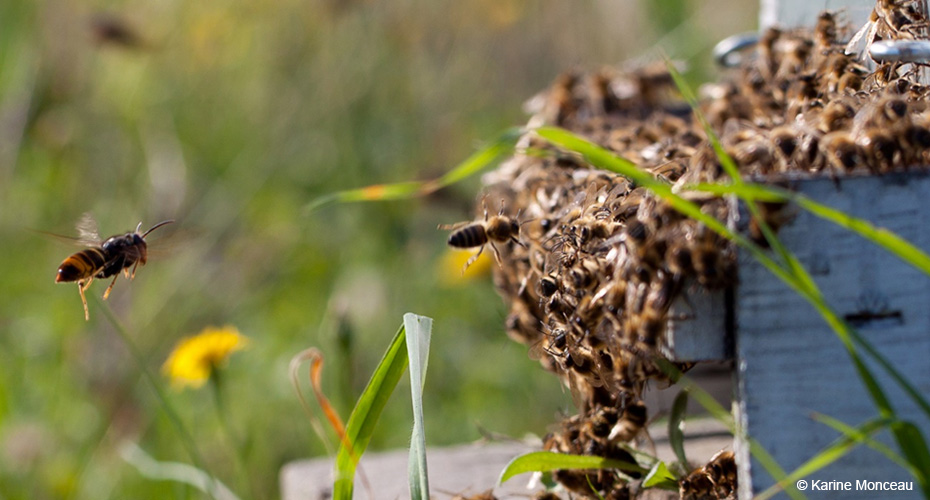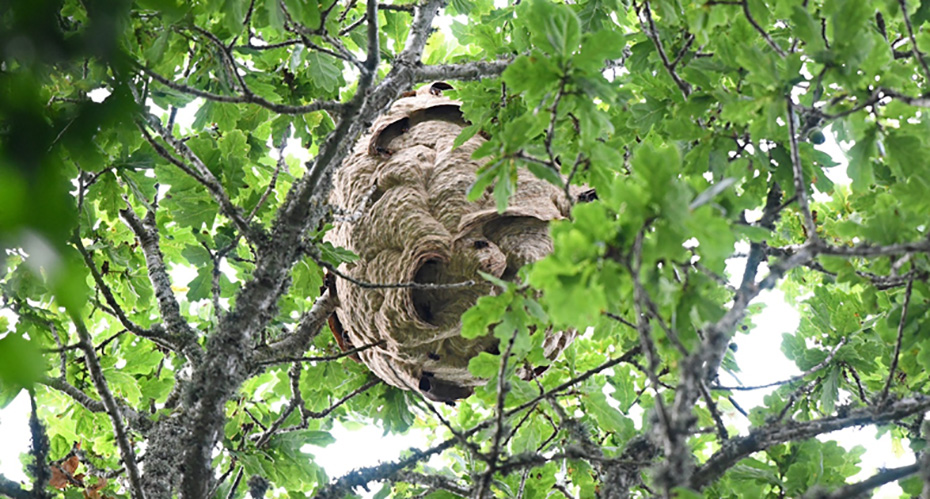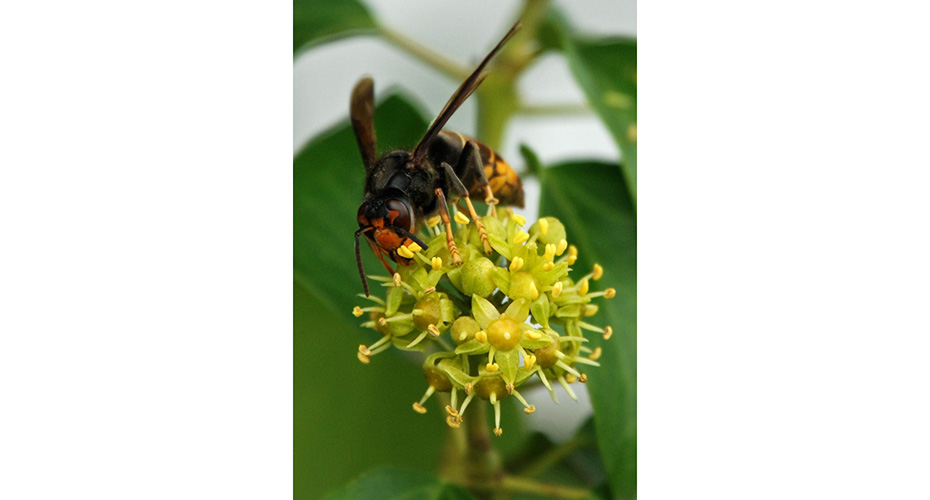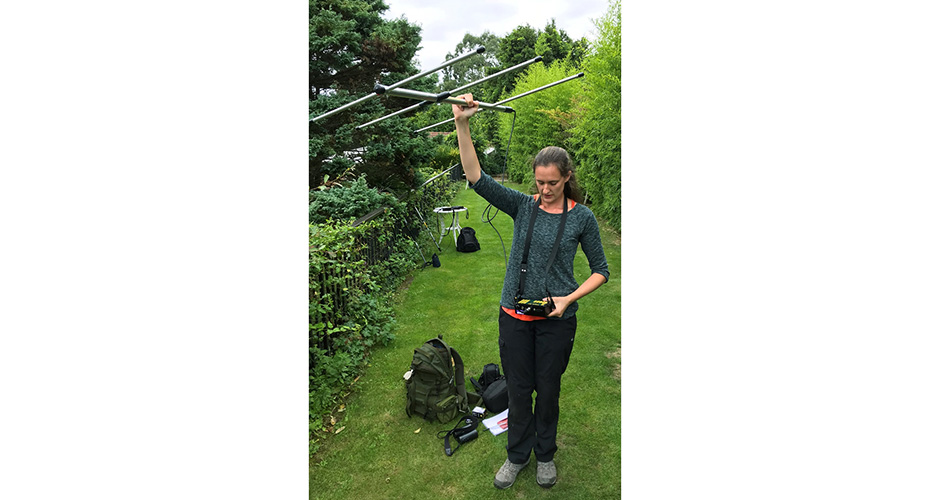Measuring and managing the emerging threat of Asian hornets
Research overview:
The Asian Hornet Vespa velutina is an invasive alien species that is rapidly spreading through Europe. Living in large nests of 5,000 to 20,000 individuals, Asian Hornets are voracious predators of insects – including honeybees, wild bees and wasps. They are having a significant impact on the viability of beekeeping and honey production in mainland Europe, and they are now poised to spread into the UK, where they could pose a significant threat to both wild and managed pollinators. This could jeopardise the essential pollination service these species provide to crops and wild flowers.
Efforts to halt or limit the spread of the Asian Hornet in the UK are reliant upon finding and destroying nests as soon as possible. In 2017, in response to a request by Defra, we developed a new method for finding Asian hornet nests, by radio-tracking individual hornets as they flew back to their nests (Kennedy et al 2018). We now have two research projects, collaborating with our European partners (BBSRC project and EU Atlantic Positive Interreg project) to further develop this technique and find new ways of managing the spread of the Asian Hornet. At the same time, we are measuring and modelling the potential impact of this invasive species on wild and managed pollinators to understand the level of threat posed by this invasive species.
Key objectives:
The BBSRC funded project (2019 – 2022) has the following aims:
- Further develop the radio telemetry method to enable efficient location of Asian Hornet nests to help limit the spread of the population in the UK and in Europe.
- Assess the impact of the Asian hornet on biodiversity by studying its diet in different environments across Europe.
- Assess the impact of the Asian hornet on wild bees and pollination services.
- Use our models of bee colony and population dynamics, BEEHAVE and BumbleBEEHAVE, to predict the potential impact of the Asian Hornet on managed and wild pollinator populations over time and in different locations.
Our contribution to the EU Atlantic Positive Project (2019 – 2022) has the following aims:
- Develop effective training materials to enable European (and international) partners and key stakeholders to utilise the radio telemetry method to locate Asian hornet nests.
- Review existing and emerging national and regional strategies targeted at controlling the Asian hornet to develop a European transnational strategy aimed at constraining its spread and minimising its impact.
Impact:
Protocols and evidence are being shared directly with policy makers in the UK, in Jersey and the EU. Knowledge and skills are being disseminated amongst beekeepers, governmental agencies that are managing the invasive species, and pest controllers. Consequently, our technique of radio-tracking hornets to find their nests is already being used in France, Spain, Switzerland, Germany and the Channel Islands. It is part of the toolset readily available to UK agencies, and was used when locating a nest in the UK in 2019.
The results of the current BBRSC project will contribute towards mitigating the environmental and economic threats caused by the species, as we will have a better understanding of the threat that it actually poses to wild insects, and the range of methods that can be used in its management.
The team are contributing to improving public awareness of the Asian Hornet and our evolving scientific understanding of this invasive species by giving talks and video documentaries to the general public and relevant interest groups.

Vespa velutina, the Asian hornet, is a fascinating species that has spread extremely rapidly through Europe since it was first discovered in France in 2004. We know for sure that it is having a severe impact on hives of honeybees across Europe, and we also know that individual nests of the species have been found in the UK. But we don’t know how much of a threat this voracious predator will pose to our wild pollinators, like bumblebees and hoverflies. Given that our wild pollinators already face multiple challenges, it is essential that we research the scale of this new threat, and also to find ways to manage the species as it seeks to establish itself throughout Europe.
Prof Juliet Osborne
Kennedy, PJ; Ford, SM; Poidatz, J; Thiery, D and Osborne J.L. (2018) Searching for nests of the invasive Asian hornet (Vespa velutina) using radio-telemetry. Communications Biology, 88 DOI: 10.1038/s42003-018-0092-9
F. Cappa, A. Cini, N. Meriggi, Juliette Poidatz, D. Thiéry, R. Cervo (in press). Immune characterization of the invasive hornet Vespa velutina and its native counterpart Vespa crabro: a comparison across caste and sex. Entomologia Generalis
“Asian hornets: First UK use of radio tags to find nest” University of Exeter, 11 October 2018
“New recruits in fight against Asian hornets” Jersey Evening Post, 2 September 2020
“Fighting the yellow-legged Asian hornet in Switzerland” CABI, 16 October 2020
“How do you track a murder hornet?” Slate Magazine, 28 October 2020
“Anwendung der Radiotelemetrie zum Aufspüren der Nester der Asiatischen Hornisse (Vespa velutina nigrithorax) in Hamburg” [Use of radio-telemetry to locate nests of the Asian hornet (Vespa velutina nigrothorax) in Hamburg] Natur und Landschaft, Vol. 96, issue 3, March 2021.
There were live presentations hosted by The British Beekeepers Association for the Asian Hornet Week 2021. Dr Peter Kennedy talked about the work done by European researchers involved in the Atlantic Positive project. Watch the video. Towards the end of the week, there was a live question and answer session. September 2021
Pete Kennedy and Juliette Poidatz gave talks at the Atlantic Positive International Open Congress on Vespa velutina. November 2021.
Prof Juliet Osborne (Exeter)
Prof Charles Tyler (Exeter)
Dr Pete Kennedy (Exeter)
Dr Juliette Poidatz (Exeter)
Dr Denis Thiery (INRA, France)
Dr Karine Monceau (La Rochelle University)
Biotechnology and Biological Sciences Research (BBSRC)
Department for Environment Food & Rural Affairs (DEFRA)
British Beekeepers Association
South West Beekeepers Forum and member beekeeping associations
European Regional Development Funds: Interreg Atlantic Area Fund




